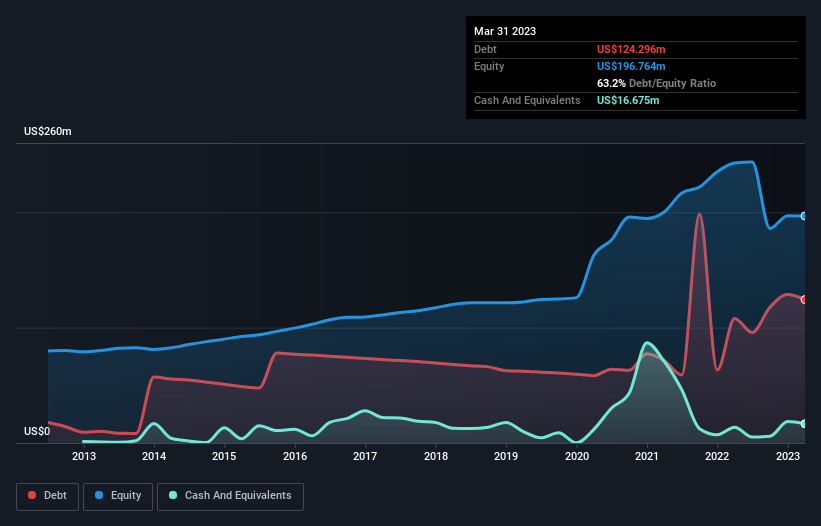Warren Buffett famously said, 'Volatility is far from synonymous with risk.' So it might be obvious that you need to consider debt, when you think about how risky any given stock is, because too much debt can sink a company. We note that AirBoss of America Corp. (TSE:BOS) does have debt on its balance sheet. But is this debt a concern to shareholders?
What Risk Does Debt Bring?
Debt assists a business until the business has trouble paying it off, either with new capital or with free cash flow. Part and parcel of capitalism is the process of 'creative destruction' where failed businesses are mercilessly liquidated by their bankers. However, a more common (but still painful) scenario is that it has to raise new equity capital at a low price, thus permanently diluting shareholders. Of course, debt can be an important tool in businesses, particularly capital heavy businesses. When we examine debt levels, we first consider both cash and debt levels, together.
Check out our latest analysis for AirBoss of America
What Is AirBoss of America's Debt?
The image below, which you can click on for greater detail, shows that at March 2023 AirBoss of America had debt of US$124.3m, up from US$107.8m in one year. On the flip side, it has US$16.7m in cash leading to net debt of about US$107.6m.

How Healthy Is AirBoss of America's Balance Sheet?
We can see from the most recent balance sheet that AirBoss of America had liabilities of US$91.9m falling due within a year, and liabilities of US$148.3m due beyond that. Offsetting this, it had US$16.7m in cash and US$110.4m in receivables that were due within 12 months. So it has liabilities totalling US$113.0m more than its cash and near-term receivables, combined.
This deficit is considerable relative to its market capitalization of US$141.0m, so it does suggest shareholders should keep an eye on AirBoss of America's use of debt. This suggests shareholders would be heavily diluted if the company needed to shore up its balance sheet in a hurry. The balance sheet is clearly the area to focus on when you are analysing debt. But ultimately the future profitability of the business will decide if AirBoss of America can strengthen its balance sheet over time. So if you're focused on the future you can check out this free report showing analyst profit forecasts.
In the last year AirBoss of America had a loss before interest and tax, and actually shrunk its revenue by 28%, to US$450m. To be frank that doesn't bode well.
Caveat Emptor
Not only did AirBoss of America's revenue slip over the last twelve months, but it also produced negative earnings before interest and tax (EBIT). Its EBIT loss was a whopping US$44m. When we look at that and recall the liabilities on its balance sheet, relative to cash, it seems unwise to us for the company to have any debt. Quite frankly we think the balance sheet is far from match-fit, although it could be improved with time. However, it doesn't help that it burned through US$959k of cash over the last year. So suffice it to say we do consider the stock to be risky. There's no doubt that we learn most about debt from the balance sheet. But ultimately, every company can contain risks that exist outside of the balance sheet. For example, we've discovered 3 warning signs for AirBoss of America (2 can't be ignored!) that you should be aware of before investing here.
If you're interested in investing in businesses that can grow profits without the burden of debt, then check out this free list of growing businesses that have net cash on the balance sheet.
New: Manage All Your Stock Portfolios in One Place
We've created the ultimate portfolio companion for stock investors, and it's free.
• Connect an unlimited number of Portfolios and see your total in one currency
• Be alerted to new Warning Signs or Risks via email or mobile
• Track the Fair Value of your stocks
Have feedback on this article? Concerned about the content? Get in touch with us directly. Alternatively, email editorial-team (at) simplywallst.com.
This article by Simply Wall St is general in nature. We provide commentary based on historical data and analyst forecasts only using an unbiased methodology and our articles are not intended to be financial advice. It does not constitute a recommendation to buy or sell any stock, and does not take account of your objectives, or your financial situation. We aim to bring you long-term focused analysis driven by fundamental data. Note that our analysis may not factor in the latest price-sensitive company announcements or qualitative material. Simply Wall St has no position in any stocks mentioned.
About TSX:BOS
AirBoss of America
Manufactures and sells rubber-based products in Canada, the United States, and internationally.
Undervalued with moderate growth potential.
Similar Companies
Market Insights
Community Narratives



